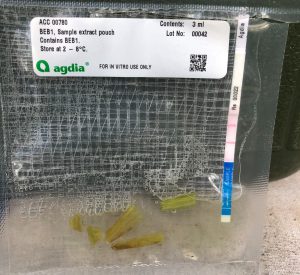One of the objectives of the Hastings Plant Triage Lab is to provide rapid diagnostics.
That means providing an answer in a timely manner with the most efficient methods and equipment available to me. That also means being aware of the resources that I can utilize and knowing where to find them.

I collectively spent two and a half years of my time as a student at the University of Florida working at the Plant Diagnostic Center. It was without a doubt the most useful form of the applied sciences that a student can experience. I learned that I’m an excellent bacterial streaker, even though I cannot memorize the Kreb’s cycle to save my life. With that said, I did form a great interest and appreciation for the many diagnostic methods available to us.
Viruses are an organism that cannot be seen with the naked eye. While the symptoms are most often observed on the new growth, they can be confused with nutrient deficiencies and other pathogenic organisms. That is where ImmunoStrip kits come in handy. Most of the kits help confirm the presence of viruses, but there are also some that can identify bacteria such as Erwinia, or oomycetes like Phytophthora.
ImmunoStrips provide results within 30 minutes of testing. Depending on the kit, leaves or stems from infected tissues are lightly ground in the mesh-bagged buffer solution. After the strips are inserted into the solution, two lines will appear if the test is positive. It’s important to rinse off any debris to prevent a false-positive from natural, opportunistic organisms in the sample.
At the Hastings Triage Lab, we can test for the following organisms/diseases using these ImmunoStrip kits:
- Acidovorax
- Clavibacter
- Cucumber green mottle mosaic
- Cucumber mosaic
- Erwinia
- Impatiens necrotic spot
- Melon necrotic spot virus
- Phytophthora (late blight)
- Potato virus X & Potato virus Y
- Potyvirus
- Ralstonia (bacterial wilt)
- Squash mosaic virus
- Tobacco mosaic (red node)
- Tomato spotted wilt
All diagnostic services offered at the Hastings Plant Triage Lab are free to commercial farmers within the Tri-County Ag Area (TCAA: St. Johns, Putnam & Flagler Counties). Contact Prissy Fletcher or Cayla Smith for assistance.
 0
0
